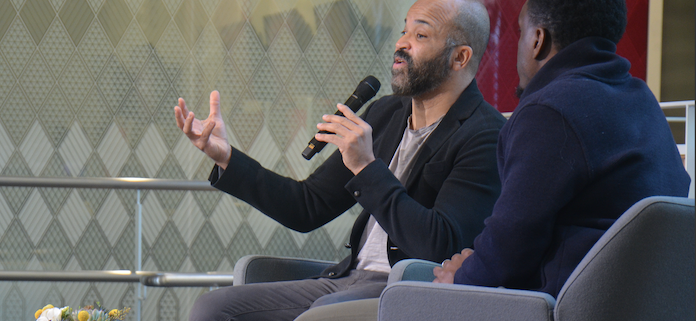Actor Jeffrey Wright talks politics, entertainment

Performers should be open to taking any role while understanding their perceived biases, ‘Westworld’ actor Jeffrey Wright told over 100 students and faculty in Wallis Annenberg Hall Thursday.
Wright sat down with Taj Frazier, director of the Institute for Diversity and Empowerment at Annenberg, to discuss activism and the entertainment industry as part of the Annenberg-HBO Diverse Voices Series.
“I think I was bitten [by the bug of storytelling] multiple times and the infection was slow to take hold,” Wright said.
Annenberg Dean Willow Bay said the goal of the speaker series was to introduce students to a variety of professionals who can speak on their diverse experiences in the entertainment industry.
“Our priority [is] in leading conversations that engage students, faculty and the larger community around some of the most pressing issues of our time,” Bay said.
Wright started the conversation by telling the audience that his grandfather, a waterman in Virginia, inspired him to become a storyteller. People from around the neighborhood would gather at his grandfather’s home bar after work and share stories.
“My grandfather was a farmer and a whisky teller … a country renaissance man,” Wright said. “As a child going down in the summer, I was surrounded by these characters.”
Wright said he was inspired by the diversity of characters who visited his grandfather’s house when he was younger.
“There were black folks, white folks, native folks,” Wright said. “For me, it was an exercise in character study and an exercise in performing. My [grandfather] was a performer.”
While growing up in Washington, D.C. in the 1960s and 1970s, politics were intertwined in every aspect of his life, Wright said.
“When you’re born in D.C., the doctor takes you out of the womb, slaps you on your ass and asks you what your political affiliation is,” Wright said.
During his early college years, Wright focused more on political activism than performance and was active in the anti-apartheid movement. Wright recalled going to the school library to read about former South African President Nelson Mandela’s imprisonment as well as participating in campus sit-ins to protest the South African government.
“It’s one thing to put on a show, but it’s another thing to effect change,” he said.
Wright discovered his interest in performance in his junior year of college. Since then, he has appeared in nine HBO productions, including “Westworld,” “Angels in America” and “Boardwalk Empire.”
Wright also won a Tony Award in 1994 for his role as Norman “Belize” Arriaga in the Broadway show “Angels in America,” which later became an HBO miniseries. He said the role was a breakthrough for his career as a storyteller and that the show had a strong impact on members of the audience who were afflicted by the AIDS epidemic.
“‘Angels in America’ was a crossroads of politics, storytelling and theater,” Wright said. “I hope you find those moments where you realize you are exactly where you need to be.”
Wright’s recent work focuses on using art as a means of activism. He produced a 2018 HBO documentary titled “We Are Not Done Yet,” which focuses on the lives of veterans and active duty service men. Wright also stars in the 2018 film “O.G.,” which tells the story of a man at the end of his 24-year prison sentence.
Toward the end of the event, Wright responded to student questions about his creative process and how he gets into character. Wright said that for characters like Belize, he addressed his own experiences and perspectives as an individual.
“I had to be aware of my sexuality and my biases when doing ‘Angels in America,’” Wright said. “More than Belize’s sexuality was his compassion, intellect, sense of community.”
Wright told students to work hard for their achievements and encouraged them to pursue their passion.
“You have to be convicted and impassioned about what you do,” he said. “If you have a vision and the pragmatic means of shaping that vision, do it. Don’t let anyone tell you not to. Don’t listen to anyone, including me.”
Sasha Urban contributed to this report.

